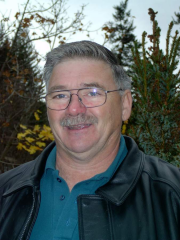
Wade Fisher started cutting trees over thirty years ago. He left the woods for the mill, the mill for the union hall and the union hall for meeting rooms with politicians and planners.
His father worked in the forest industry and so does his son, but he's clearly worried there won't be much work for future generations.
When I was in Williams Lake, B.C. a few months ago, I asked friends there to name the best person to talk to about trees. They said I had to meet Wade.
Wade had just been lured out of retirement to represent forest workers on the Cariboo Chilcotin Beetle Action Coalition and to chair the CCBAC's forest worker strategy sector. By the time we talked Wade had withdrawn from the group and he explained that while this may have been the right issue for him, it was the wrong time and place for him to take it on. He'd previously participated in the Cariboo Chilcotin land use planning process and co-chaired the Cariboo Chilcotin Economic Action Forum.
Wade and I met in my friend's living room for a free ranging conversation. Click the Listen to this! link to hear Wade about talk about vanishing trees, vanishing lifestyles and how the provincial government's policies could have an even more devastating impact on workers than the beetles.
Or listen and subscribe to Tyee podcasts on iTunes.
Related Tyee stories:
- Tree Love and Murder
A Trees and Us podcast with George Bowering. - Why Rocket Science Is Easier than Forestry
A 'Trees and Us' Tyee podcast with Jean-Pierre Kiekens. - Why Humans and Nature Collide
A 'Trees and Us' Tyee podcast with John Vaillant. - Trees and Us
Our new podcast series asks: what does the forest mean to you? First up, Severn Cullis-Suzuki.
Read more: Podcasts
















Tyee Commenting Guidelines
Comments that violate guidelines risk being deleted, and violations may result in a temporary or permanent user ban. Maintain the spirit of good conversation to stay in the discussion.
*Please note The Tyee is not a forum for spreading misinformation about COVID-19, denying its existence or minimizing its risk to public health.
Do:
Do not: